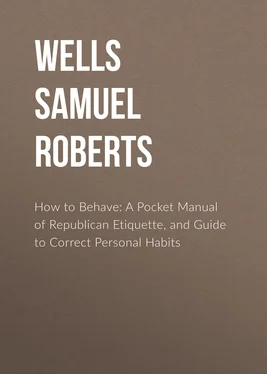Samuel Wells - How to Behave - A Pocket Manual of Republican Etiquette, and Guide to Correct Personal Habits
Здесь есть возможность читать онлайн «Samuel Wells - How to Behave - A Pocket Manual of Republican Etiquette, and Guide to Correct Personal Habits» — ознакомительный отрывок электронной книги совершенно бесплатно, а после прочтения отрывка купить полную версию. В некоторых случаях можно слушать аудио, скачать через торрент в формате fb2 и присутствует краткое содержание. Жанр: foreign_edu, Философия, на английском языке. Описание произведения, (предисловие) а так же отзывы посетителей доступны на портале библиотеки ЛибКат.
- Название:How to Behave: A Pocket Manual of Republican Etiquette, and Guide to Correct Personal Habits
- Автор:
- Жанр:
- Год:неизвестен
- ISBN:нет данных
- Рейтинг книги:5 / 5. Голосов: 1
-
Избранное:Добавить в избранное
- Отзывы:
-
Ваша оценка:
- 100
- 1
- 2
- 3
- 4
- 5
How to Behave: A Pocket Manual of Republican Etiquette, and Guide to Correct Personal Habits: краткое содержание, описание и аннотация
Предлагаем к чтению аннотацию, описание, краткое содержание или предисловие (зависит от того, что написал сам автор книги «How to Behave: A Pocket Manual of Republican Etiquette, and Guide to Correct Personal Habits»). Если вы не нашли необходимую информацию о книге — напишите в комментариях, мы постараемся отыскать её.
How to Behave: A Pocket Manual of Republican Etiquette, and Guide to Correct Personal Habits — читать онлайн ознакомительный отрывок
Ниже представлен текст книги, разбитый по страницам. Система сохранения места последней прочитанной страницы, позволяет с удобством читать онлайн бесплатно книгу «How to Behave: A Pocket Manual of Republican Etiquette, and Guide to Correct Personal Habits», без необходимости каждый раз заново искать на чём Вы остановились. Поставьте закладку, и сможете в любой момент перейти на страницу, на которой закончили чтение.
Интервал:
Закладка:
Samuel R. Wells
How to Behave: A Pocket Manual of Republican Etiquette, and Guide to Correct Personal Habits / Embracing an Exposition of the Principles of Good Manners; Useful Hints on the Care of the Person, Eating, Drinking, Exercise, Habits, Dress, Self-culture, and Behavior at Home; the Etiquette of Salutations, Introductions, Receptions, Visits, Dinners, Evening Parties, Conversation, Letters, Presents, Weddings, Funerals, the Street, the Church, Places of Amusement, Traveling, Etc., with Illustrative Anecdotes, a Chapter on Love and Courtship, and Rules of Order for Debating Societies
PREFACE
This is an honest and earnest little book, if it has no other merit; and has been prepared expressly for the use of the young people of our great Republic, whom it is designed to aid in becoming, what we are convinced they all desire to be, true American ladies and gentlemen.
Desiring to make our readers something better than mere imitators of foreign manners, often based on social conditions radically different from our own—something better than imitators of any manners, in fact, we have dwelt at greater length and with far more emphasis upon general principles, than upon special observances, though the latter have their place in our work. It has been our first object to impress upon their minds the fact, that good manners and good morals rest upon the same basis, and that justice and benevolence can no more be satisfied without the one than without the other.
As in the other numbers of this series of Hand-Books, so in this, we have aimed at usefulness rather than originality; but our plan being radically different from that of most other manuals of etiquette, we have been able to avail ourself to only a very limited extent of the labors of others, except in the matter of mere conventional forms.
Sensible of the imperfections of our work, but hoping that it will do some acceptable service in the cause of good manners, and aid, in a humble way, in the building up of a truly American and republican school of politeness, we now submit it, with great deference, to a discerning public.
INTRODUCTION
Some one has defined politeness as "only an elegant form of justice;" but it is something more. It is the result of the combined action of all the moral and social feelings, guided by judgment and refined by taste. It requires the exercise of benevolence, veneration (in its human aspect), adhesiveness, and ideality, as well as of conscientiousness. It is the spontaneous recognition of human solidarity—the flowering of philanthropy—the fine art of the social passions. It is to the heart what music is to the ear, and painting and sculpture to the eye.
One can not commit a greater mistake than to make politeness a mere matter of arbitrary forms. It has as real and permanent a foundation in the nature and relations of men and women, as have government and the common law. The civil code is not more binding upon us than is the code of civility. Portions of the former become, from time to time, inoperative—mere dead letters on the statute-book, on account of the conditions on which they were founded ceasing to exist; and many of the enactments of the latter lose their significance and binding force from the same cause. Many of the forms now in vogue, in what is called fashionable society, are of this character. Under the circumstances which called them into existence they were appropriate and beautiful; under changed circumstances they are simply absurd. There are other forms of observances over which time and place have no influence—which are always and everywhere binding.
Politeness itself is always the same. The rules of etiquette, which are merely the forms in which it finds expression, vary with time and place. A sincere regard for the rights of others, in the smallest matters as well as the largest, genuine kindness of heart; good taste, and self-command, which are the foundations of good manners, are never out of fashion; and a person who possesses them can hardly be rude or discourteous, however far he may transgress conventional usages: lacking these qualities, the most perfect knowledge of the rules of etiquette and the strictest observance of them will not suffice to make one truly polite.
"Politeness," says La Bruyère, "seems to be a certain care, by the manner of our words and actions, to make others pleased with us and themselves." This definition refers the matter directly to those qualities of mind and heart already enumerated as the foundations of good manners. To the same effect is the remark of Madame Celnart, that "the grand secret of never-failing propriety of deportment is to have an intention of always doing right ."
Some persons have the "instinct of courtesy" so largely developed that they seem hardly to need culture at all. They are equal to any occasion, however novel. They never commit blunders, or if they do commit them, they seem not to be blunders in them. So there are those who sing, speak, or draw intuitively—by inspiration. The great majority of us, however, must be content to acquire these arts by study and practice. In the same way we must acquire the art of behavior, so far as behavior is an art. We must possess, in the first place, a sense of equity, good-will toward our fellow-men, kind feelings, magnanimity and self-control. Cultivation will do the rest. But we most never forget that manners as well as morals are founded on certain eternal principles, and that while "the letter killeth," "the spirit giveth life ."
The account which Lord Chesterfield gives of the method by which he acquired the reputation of being the most polished man in England, is a strong example of the efficacy of practice, in view of which no one need despair. He was naturally singularly deficient in that grace which afterward so distinguished him. "I had a strong desire," he says, "to please, and was sensible that I had nothing but the desire. I therefore resolved, if possible, to acquire the means too. I studied attentively and minutely the dress, the air, the manner, the address, and the turn of conversation of all those whom I found to be the people in fashion, and most generally allowed to please. I imitated them as well as I could: if I heard that one man was reckoned remarkably genteel, I carefully watched his dress, motions, and attitudes, and formed my own upon them. When I heard of another whose conversation was agreeable and engaging I listened and attended to the turn of it. I addressed myself, though de très mauvaise grâce [with a very bad grace], to all the most fashionable fine ladies; confessed and laughed with them at my own awkwardness and rawness, recommending myself as an object for them to try their skill in forming."
Lord Bacon says: "To attain good manners it almost sufficeth not to despise them, and that if a man labor too much to express them, he shall lose their grace, which is to be natural and unaffected."
To these testimonies we may add the observation of La Rochefoucauld, that "in manners there are no good copies, for besides that the copy is almost always clumsy or exaggerated, the air which is suited to one person sits ill upon another."
The greater must have been the genius of Chesterfield which enabled him to make the graces of others his own, appropriating them only so far as they fitted him , instead of blindly and servilely imitating his models.
C. P. Bronson truly says: "In politeness, as in every thing else connected with the formation of character, we are too apt to begin on the outside, instead of the inside; instead of beginning with the heart, and trusting to that to form the manners, many begin with the manners, and leave the heart to chance and influences. The golden rule contains the very life and soul of politeness: 'Do unto others as you would they should do unto you.' Unless children and youth are taught, by precept and example, to abhor what is selfish, and prefer another's pleasure and comfort to their own, their politeness will be entirely artificial, and used only when interest and policy dictate. True politeness is perfect freedom and ease, treating others just as you love to be treated. Nature is always graceful: affectation, with all her art, can never produce any thing half so pleasing. The very perfection of elegance is to imitate nature; how much better to have the reality than the imitation! Anxiety about the opinions of others fetters the freedom of nature and tends to awkwardness; all would appear well if they never tried to assume what they do not possess."
Читать дальшеИнтервал:
Закладка:
Похожие книги на «How to Behave: A Pocket Manual of Republican Etiquette, and Guide to Correct Personal Habits»
Представляем Вашему вниманию похожие книги на «How to Behave: A Pocket Manual of Republican Etiquette, and Guide to Correct Personal Habits» списком для выбора. Мы отобрали схожую по названию и смыслу литературу в надежде предоставить читателям больше вариантов отыскать новые, интересные, ещё непрочитанные произведения.
Обсуждение, отзывы о книге «How to Behave: A Pocket Manual of Republican Etiquette, and Guide to Correct Personal Habits» и просто собственные мнения читателей. Оставьте ваши комментарии, напишите, что Вы думаете о произведении, его смысле или главных героях. Укажите что конкретно понравилось, а что нет, и почему Вы так считаете.












